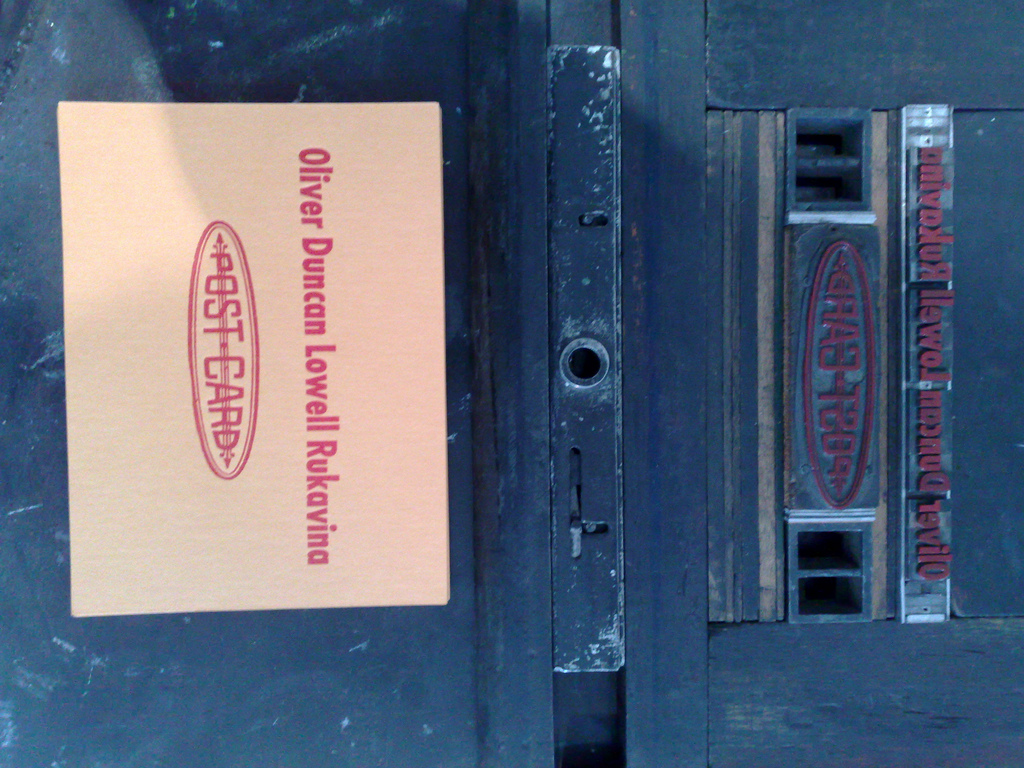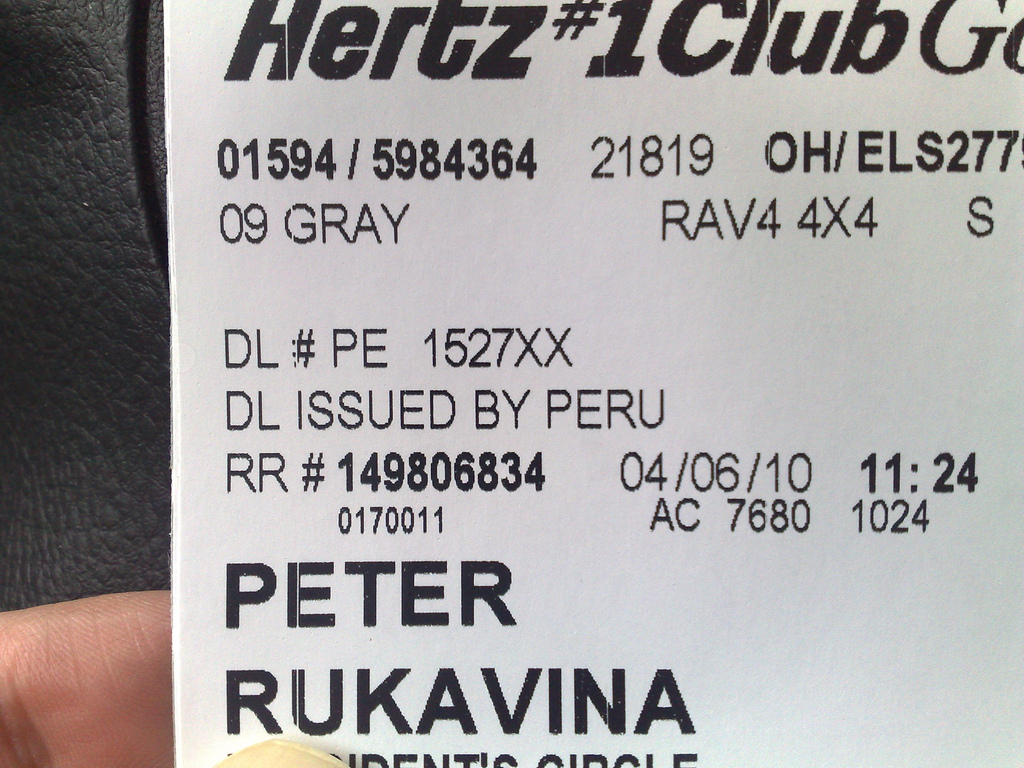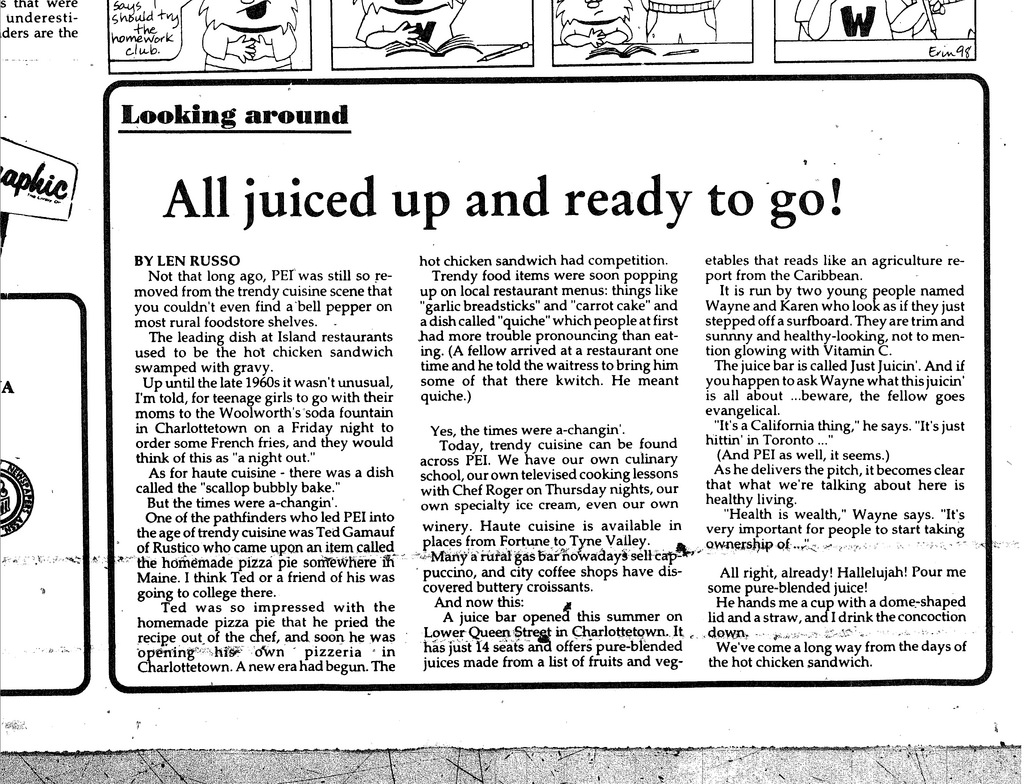Given my passion for type and design and printing, why did I wait 44 years before touching a printing press for the first time? Who knows. But, man oh man, did I have a good time once I did.
If you’re within reach of Brooklyn and have an interest in letterpress printing, I highly recommend you consider a workshop at The Arm. It’s a great space, and Dan, who owns the space and runs the workshop, is am excellent teacher, hitting a sweet spot of instruction and standing back.
I’ve posted some photos of the workshop and some of the printed results; here’s my favourite:

Running late for a dinner down the road, I left the Yankee in a hurry. Ever-mindful of Catherine’s social dictates – “yes, you always need to bring a bottle of wine” – I swung into the Dublin General Store, remembering that they’ve a tiny wine room tucked in between the cash and the room with the knitting supplies.
I picked out a suitably eclectic-looking red wine – a bottle of Bully Hill Love my Goat – and grabbed a roll of Sweet Mint Lifesavers and headed to the cash.
Handed over my credit card, signed the slip.
And then.
“Did you happen to write a review of the store on the Internet?” asks the woman behind the cash – the friendly woman who’s always there.
“Um, maybe…, ” I replied.
“Well, we were searching on the Internet and we found a review, and I’m pretty sure that was your picture.”
Fortunately, it seems, I only wrote good things.
And so reviewer met reviewed. It was kind of delightful and kind of uncomfortable.
They do continue to make a very good smoked turkey wrap. And now, for an extra $1, you can get bacon on it.
While it’s no longer a novelty for Americans, the Hulu.com website is a great distraction for me on my trips to the U.S. Who can resist an opportunity to watch free on-demand episodes of Newhart and Lou Grant. Certainly not I.
Last night’s Hulu adventure was my first watching of the movie Ishtar. I’m a devoted Warren Beatty fan, and so this was long overdue.
Many words have been spilled over the years about Ishtar and I’ve little to add other than there’s no doubt that the script is flaky and the acting variably brilliant and foggy. But, even with those challenges, it’s still an entertaining and sometimes bitingly funny picture.
Tonight’s movie was the contemporary film Ghost Writer starring Ewan McGregor, Olivia Williams and Pierce Brosnan and directed by Roman Polanski.
I drove an hour to the west and into Vermont to the Latchis Theatre in Brattleboro for this – I’d been wanting to see a movie there for years and years.
I was not disappointed: it’s a beautifully shot, tautly-directed political thriller. McGregor and Williams in particular are great, and the setting – northern Germany standing in for Martha’s Vineyard – and the (constantly raining) weather were perfect backgrounds for the swirling plot.
Hertz’s computers see “PE” (for “Prince Edward Island”) and mistakenly interpret “Peru.”

I’m off at the crack of dawn tomorrow morning to spend the week with my colleagues at Yankee in Dublin, NH.
I’ll be there until Saturday and them I’m heading down to Boston for the night and then flying down-and-back on Sunday to New York City for a printing workshop at The Arm. Monday morning I’ll fly back to the Island.
Expect the usual range of “Air Canada is such a horrible airline,” “complaining about the pillows” and “odd things about New Englanders” posts and tweets for the next week as a result.
For a long time my favourite newspaper columnist on Prince Edward Island was Len Russo. I never completely understood where Len came from, or what he did for a living (can you make an income as a weekly columnist on PEI – if so, sign me up!). But boy could he write a column.
I met Len for the first time when he walked into Catherine Hennessey’s old house on Dorchester Street one Saturday afternoon.
I was sitting at the kitchen table talking to Catherine about something or another and Len walked in a started, unbidden, making focaccia (it was very good). And then he left.
From then on I would see Len from time to time in Catherine’s kitchen. But mostly I knew Len from his weekly column in the Eastern Graphic.
And my favourite column of Len’s was the one that appeared in the September 23, 1998 edition of the Graphic, titled All juiced up and ready to go! Publisher Paul MacNeill was kind enough to give me permission to reprint it here:
Not that long ago, PEI was still so removed from the trendy cuisine scene that you couldn’t even find a bell pepper on most rural foodstore shelves.
The leading dish at Island restaurants used to be the hot chicken sandwich swamped with gravy.
Up until the late 1960s it wasn’t unusual I’m told, for teenage girls to go with their moms to the Woolworth’s soda fountain in Charlottetown on a Friday night to order some French fries, and they would thing of this as “a night out.”
As for haute cuisine - there was a dish called the “scallop bubbly bake.”
But the times were a-changin.
One of the pathfinders who led PEI into the age of trendy cuisine was Ted Gamauf of Rustico who came upon an item called the home-made pizza pie somewhere in Maine I think Ted or a friend of his was going to college there.
Ted was so impressed with the homemade pizza pie that he pried the recipe out of the chef, and soon he was opening his own pizzeria in Charlottetown. A new era had begun. The hot chicken sandwich had competition.
Trendy food items were soon popping up on local restaurant menus: things like “garlic breadsticks” and “carrot cake” and a dish called “quiche” which people at first had more trouble pronouncing than eating. (A fellow arrived at a restaurant one time and he told the waitress to bring him some of that there kwitch. He meant quiche.)
Yes, the times were a-changin’.
Today, trendy cuisine can be found across PEI. We have our own culinary school, our own televised cooking lessons with Chef Roger on Thursday nights, our own specialty ice cream, even our own winery. Haute cuisine is available in places from from Fortune to Tyne Valley.
Many a rural gas bar nowadays sell cappuccino, and city coffee shops have discovered buttery croissants.
And now this:
A juice bar opened this summer on Lower Queen Street in Charlottetown. It has just 14 seats and offers pure-blended juices made from a list of fruits and vegetables that reads like an agriculture report from the Caribbean.
It is run by two young people named Wayne and Karen who look as if they just stepped off a surfboard. They are trim and sunny and healthy-looking, not to mention glowing with Vitamin C.
The juice bar is called Just Juicin’. And if you happen to ask Wayne what this juicin’ is all about …beware, the fellow goes evangelical.
“It’s a California thing,” he says. “It’s just hittin’ in Toronto…”
(And PEI as well, it seems.)
As he delivers the pitch, it becomes clear that what we’re talking about here is healthy living.
“Health is wealth,” Wayne says. “It’s very important for people to start taking ownership of…”
All right, already! Hallelujah! Pour me some pureblended juice!
He hands me a cup with a dome-shaped lid and a straw, and I drink the concoction down.
We’ve come a long way from the days of the hot chicken sandwich.
Just Juicin’ has come and gone, of course, and the latest incarnation of the space on Lower Queen Street that it once occupied is the new Zen Sushi restaurant. With that, and the four Taiwanese tea houses, the two Korean restaurants, and the three Asian grocery stores, I doubt Len would recognize today’s Prince Edward Island.
(A side-note about process: I remember the column clearly, but has no notion of when it ran. So I went to the Province of PEI Corporations directory and found that Just Juicin’ was originally registered in 1998. I then went up to the Robertson Library at UPEI at started scrolling through the microfilm of the Eastern Graphic starting in 1998; didn’t take me too long to get to the September 23 issue. I then used their nifty digital microfilm scanner to scan the column, emailed it to myself using GMail and, when I got back to the office, ran the Google Docs OCR machine over it to extract the text)

Can someone explain to me the logistics and economics of Halifax radio station advertising that’s inserted into selected cable channels – CNN and Peachtree seem to have it the most – in place of ads from the networks themselves?
Back in 1984 I had the pleasure of spending several years working part-time with Dr. Chris McGowan at the Royal Ontario Museum. Chris retired recently, and he’s now penned a book for children called Abacus:
Abacus is an adventure story in which 12-year-old AP, who’s into science, travels through time with Kate, his 15-year-old sister. Kate thinks her geeky brother is a waste of space, but when he uses science to get them out of trouble, she starts changing her mind. Their journeys take them to medieval England, the Wild West, and to ancient Egypt, where AP’s science is seen as magic. And stalking them on every trip is a hooded stranger whose attacks show he’ll do anything to stop them.
I’ve just ordered a copy (it fits well with Oliver’s current interest in both time travel and dinosaurs).
There’s a story about my great-grandfather Ed Caswell in this week’s Cochrane Times-Post. The story begins:
As we mark the centennial of Cochrane’s incorporation this year, there are many builders, business leaders, parents, and politicians who could be celebrated and cited as critical to the town’s creation and endurance. When we recognize that the town’s survival through the gritty early years was really a function of the collective efforts of many seemingly ordinary people, it becomes particularly difficult to point to a single hero. There were many. But if we had to pick one exemplary fellow to represent the group, Ed Caswell would be a good choice.
 I am
I am